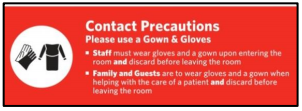Transmission-Based Precautions (Isolation): Antibiotic-Resistant Organisms

Doctors use antibiotic medicines to kill bacteria or to stop their growth. Antibiotics can treat many infections. Some bacteria can develop resistance when antibiotics are used too often or not used correctly (for example, when a person does not finish a prescription). Resistance can make infections very hard to treat. Sometimes the resistant bacteria cannot be treated at all.
These bacteria are called antibiotic-resistant organisms. They include:
- MRSA (Methicillin-resistant Staphylococcus aureus)
- RGNR (Resistant Gram Negative Rods)
- VRE (Vancomycin-Resistant Enterococci)
See page 3 for facts about these bacteria.
Who Is at Risk
Children may already have these germs when they come to the hospital. Or they may get them in the hospital. People do not always get sick from these bacteria but they can still spread the germs to others. People at risk for getting severe infections include:
- People who already have another serious disease
- People with low immunity (such as from cancer treatment, HIV or AIDS)
- Those who have a tube in their bladder or a tube in a vein (like a broviac catheter)
- People who are already very ill
How It Is Spread
- Touching toys or other things that have these germs on them
- Germs on surfaces like bed rails, doorknobs, night stands
- Contact with people whose hands have not been washed well
- Patient-to-patient contact, such as in a playroom
To Prevent Spreading These Germs
If your child has an antibiotic-resistant germ, these steps will be taken:
- Your child will be on Contact Precautions. See Helping Hand HH-II-176, Transmission Based Precautions (Isolation): Contact Precautions.
- You must wash your hands or use the alcohol-based hand rub before and after contact with your child and after touching items in your child’s room. Hand washing is important to prevent the spread of these germs.
- Toys and equipment may not be shared with other patients.
- Going to the playroom is not allowed.
Rules for Parents, Visitors and Healthcare Workers
- Everyone (parents, family, guests, and healthcare workers) must wash their hands or use alcohol-based hand rub before and after touching your child or surfaces in your child’s room.It is all right for you to remind others to perform hand hygiene.
- By not wearing the needed gown or gloves, you may spread germs to other children or visitors. This can make other children or visitors very sick.
- If parents are resting on the bedside furniture, they do not need to wear gowns or gloves.Gown or gloves need to be worn only when the parent will be helping with the child’s care or coming in contact with body fluids.Some examples are:
- Parents who are helping with dressing changes or suctioning their child need to wear gloves.
- If a child has diarrhea or has been vomiting, parents need to wear gowns while holding the child on their laps.
 While breastfeeding your child or while performing skin to skin care (Kangaroo Care) in the Neonatal Intensive Care Unit (NICU)you do not need to wear a gown and gloves.
While breastfeeding your child or while performing skin to skin care (Kangaroo Care) in the Neonatal Intensive Care Unit (NICU)you do not need to wear a gown and gloves.
- Family (including siblings) and guests who will touch your child must follow the precautions posted on the door to the child’s room (Picture 1).
- If your child has MRSA, RGNR or VRE he may need to be on Contact Precautions during future visits to Nationwide Children’s Hospital or clinics.Your doctor or nurse can explain these rules.
- Ask your doctor or nurse if you want information about testing that may be available to find out if your child no longer has an antibiotic-resistant organism.
Care at Home
After your child goes home, no special steps need to be taken unless a friend or family member is at risk. See "Who is at risk" on page 1.
If you have any questions, be sure to ask a member of your child’s healthcare team.
Types of Resistant Bacteria
MRSA (Methicillin-Resistant Staphylococcus aureus) – Staphylococci (Staph) are found everywhere in nature, often on people's skin. MRSA is resistant to the antibiotics that usually treat Staph and often are resistant to other antibiotics as well. Most often MRSA is found in skin infections, urinary tract infections, endocarditis (infection of the lining
of the heart) and pneumonia.
RGNR (Resistant Gram Negative Rods) - These bacteria are found in plants, soil, water, and in the intestines of people and animals. They are resistant to many antibiotics. RGNR are often found in wound, urinary tract and intestinal infections.
VRE (Vancomycin-Resistant Enterococcus) - These bacteria are found in the gastrointestinal tract and the female genital tract. Many may not cause an infection. VRE can cause infections of the urinary tract, in the blood, or in wounds from surgery.
HH-II-135 10/97 Revised 1/18 Copyright 1997, Nationwide Children’s Hospital
